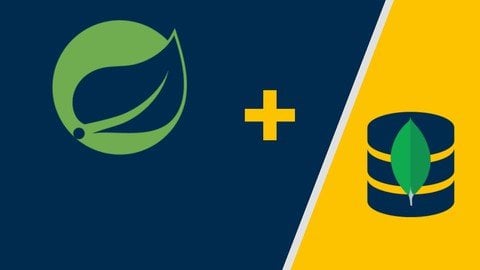
Published 1/2023
MP4 | Video: h264, 1280×720 | Audio: AAC, 44.1 KHz
Language: English | Size: 1.20 GB | Duration: 3h 1m
Master the Powerful Stack of Spring Boot and MongoDB for Modern Web Development and Data Storage
What you’ll learn
Master the MongoDB
Integrate MongoDB with Spring boot 3.0
Integrate OpenApi with Spring boot 3.0 and MongoDB
Write advance search queries
Requirements
Basic Java knowledge
Description
Learning Spring Boot and MongoDB can be extremely valuable for students looking to gain skills in modern web development and data storage.Here is why you need to learn and master these two technologiesSpring Boot is a popular framework for building Java-based web applications. It makes it easy to create stand-alone, production-grade Spring-based applications that you can “just run”. This means that you can quickly get up and running with a new project and start building their application without having to spend time on configuration.MongoDB is a leading NoSQL database that is widely used in modern web applications. It is a flexible, scalable, and high-performance database that can handle large amounts of data. By learning MongoDB, you will be able to build applications that can store and manage large amounts of data efficiently.Together, Spring Boot and MongoDB form a powerful stack for building modern web applications. By learning both technologies, students will be able to build full-stack applications that can handle both the front-end and back-end aspects of web development.There is high demand for developers with skills in Spring Boot and MongoDB. Companies of all sizes are looking for developers who can build modern web applications using these technologies, so learning them can open up new career opportunities for students.Overall, learning Spring Boot and MongoDB can be a great investment for students looking to gain valuable skills in modern web development and data storage.By purchasing a course on these technologies, you can learn from experienced instructor and get the support and guidance you need to succeed.
Overview
Section 1: Introduction
Lecture 1 What is mogoDB
Lecture 2 Th difference between SQL and NoSQL
Lecture 3 How to choose between SQL and NoSQL
Section 2: Prepare the mongo environment
Lecture 4 MongoDB UI tools
Lecture 5 Why using docker for development
Lecture 6 Create an empty docker compose file
Lecture 7 Mongo server (Docker compose)
Lecture 8 Mongo express (Docker compose)
Lecture 9 Run and test
Section 3: Mongo terms
Lecture 10 Collections and documents in Mongo
Section 4: Bootstrapping the application
Lecture 11 Create a new Spring boot 3.0 project
Lecture 12 Project structure
Lecture 13 Include the docker compose with the project and run it
Lecture 14 Project architecture
Lecture 15 Connect to MongoDB
Lecture 16 Create a new database
Lecture 17 Understand Admin – Local and Config databases
Lecture 18 Create a java class
Lecture 19 Transform the java class to a Collection
Lecture 20 Create a mongo repository
Lecture 21 Insert the first data into the Collection
Lecture 22 Create a product service
Lecture 23 Save the product
Lecture 24 Find product by ID
Lecture 25 Find all products
Lecture 26 Delete product
Section 5: CRUD operations
Lecture 27 Create product Controller
Lecture 28 Save product operation
Lecture 29 Find all products
Lecture 30 Find product by ID
Lecture 31 Delete product
Lecture 32 Test the CRUD operations
Section 6: DBRef and collections relationships
Lecture 33 Extend the product model
Lecture 34 Create Category java class
Lecture 35 User Category as a field
Lecture 36 Relationship between Category and Product
Lecture 37 Transform the Category to a collection
Lecture 38 Create a category repository
Lecture 39 Insert categories at startup
Lecture 40 The issue in linking collections
Lecture 41 Add relationship between collections
Section 7: OpenApi integration
Lecture 42 Add OpenApi dependency
Lecture 43 Test and play with Swagger UI
Section 8: Documents queries and Mongo template
Lecture 44 Extend the product model
Lecture 45 Create a search service
Lecture 46 What is MongoTemplate
Lecture 47 Is() query
Lecture 48 Testing the Is() query
Lecture 49 Regex() query
Lecture 50 Lt() query
Lecture 51 Gt() query
Lecture 52 Sorting data
Lecture 53 Paging and Sorting
Section 9: Query methods
Lecture 54 Create a query method service
Lecture 55 FindByX query
Lecture 56 FinByX ignore case query
Lecture 57 FinByX starting with query
Lecture 58 FinByX ending with query
Lecture 59 FinByX containing query
Lecture 60 FinByX less than
Lecture 61 FinByX greater than
Lecture 62 FinByX between
Lecture 63 FinByX and SortByY
Lecture 64 Paging and Sorting
Student,Junior developers
Password/解压密码www.tbtos.com
转载请注明:0daytown » [2023]:Master Spring Boot 3.0 And Mongodb – The Full Course